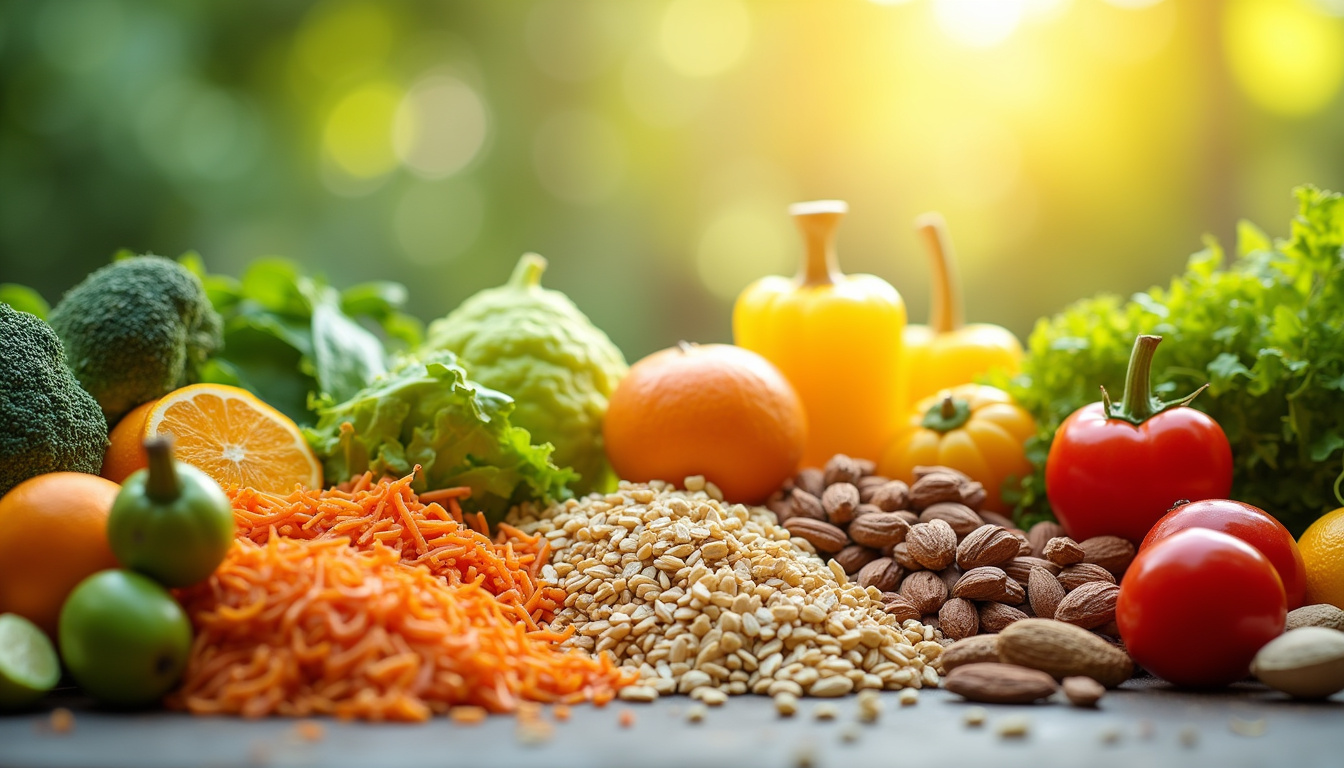
Unlock the Secrets: Essential Nutrition for Healthy Aging
Share
As we journey through life, the importance of nutrition for healthy aging cannot be overstated. With each passing birthday, our bodies undergo a myriad of changes that can affect our overall health and vitality. Embracing a holistic approach grounded in natural, plant-based medicine can empower us to navigate this journey with grace and resilience. In this article, we'll delve into the critical role of nutrition in the aging process, identify essential nutrients for senior health, and provide practical tips for implementing a healthy diet that aligns with a faith-based, wellness-oriented lifestyle. Together, let’s unlock the secrets to thriving in our golden years.

Key Takeaways
- Nutrition plays a crucial role in promoting healthy aging.
- Key nutrients such as antioxidants, omega-3 fatty acids, and vitamins D and B12 are vital for senior health.
- Maintaining hydration is essential for optimal bodily functions in older adults.
- Practical meal planning can help incorporate nutrient-dense foods into daily diets.
- Regularly evaluating dietary choices can significantly impact longevity and overall well-being.
Understanding the Role of Nutrition in Aging
As we journey through life, our bodies naturally undergo various changes, especially as we age. Understanding the role of nutrition in aging is vital, as it directly influences our overall health, vitality, and longevity. Nutrition for healthy aging encompasses more than just counting calories; it’s about nourishing our bodies with the right foods to promote wellness and prevent age-related diseases. A diet rich in whole, plant-based foods can provide essential vitamins, minerals, and antioxidants that combat oxidative stress and inflammation, two significant factors in the aging process. Incorporating nutrient-dense foods like leafy greens, colorful fruits, whole grains, nuts, and seeds can help enhance cognitive function, maintain healthy skin, and support cardiovascular health. Furthermore, embracing an intentional approach to nutrition encourages personal freedom in health choices, allowing individuals to make informed decisions that resonate with their values and beliefs—especially those grounded in biblical principles of stewardship over the body. By prioritizing nutrition for healthy aging, we empower ourselves to thrive in our later years, fostering a holistic sense of well-being while steering clear of the synthetic treatments often championed by mainstream medicine.
Key Nutrients for Senior Health
As we age, maintaining optimal health becomes increasingly important, making proper nutrition for healthy aging a priority. Seniors often face unique nutritional needs that, when met, can significantly enhance their quality of life. Here are key nutrients essential for seniors that not only support bodily functions but also foster resilience against age-related ailments:
1. Protein: Necessary for muscle maintenance and repair, protein helps to prevent muscle loss, which can lead to frailty. Opt for lean sources, such as beans, legumes, and poultry, to ensure adequate intake.
2. Calcium and Vitamin D: These two nutrients are vital for bone health, reducing the risk of osteoporosis. Seniors should aim for dairy or fortified plant-based sources to get their daily dose.
3. Omega-3 Fatty Acids: Found in fish, flaxseeds, and walnuts, omega-3s are known for their anti-inflammatory properties and support brain health, reducing the risk of cognitive decline.
4. Fiber: A high-fiber diet aids digestive health, helps manage blood sugar levels, and lowers cholesterol. Include a variety of fruits, vegetables, and whole grains in daily meals.
5. Antioxidants: Nutrients like vitamins C and E, found in a colorful array of fruits and vegetables, combat free radicals and help maintain cellular health.
By focusing on these essential nutrients, seniors can embrace healthy aging naturally, empowering themselves to live vibrantly in alignment with holistic wellness principles. At JustVitamins.org, we believe in equipping you with the knowledge and supplements necessary to support your journey towards optimal health.
'Let food be thy medicine and medicine be thy food.' – Hippocrates

Practical Tips for Implementing a Healthy Diet
### Practical Tips for Implementing a Healthy Diet: Embracing Nutrition for Healthy Aging
As we navigate the journey of life, one of the most profound ways to honor our bodies and foster wellness is through mindful nutrition for healthy aging. When we think about aging, we often envision a decline in vitality; however, it's entirely possible to enhance our well-being through the choices we make daily. By incorporating nourishing foods into our diet that promote longevity, we can thrive both physically and mentally. Here are some practical tips to help you implement a healthy diet that aligns with a plant-based approach and supports natural wellness:
• Prioritize Whole, Plant-Based Foods: Focus on incorporating a variety of fruits, vegetables, whole grains, legumes, nuts, and seeds into your meals. These foods are rich in essential vitamins, minerals, and antioxidants that contribute to overall health and longevity.
• Stay Hydrated: Water is vital in maintaining bodily functions and promoting healthy aging. Aim to drink plenty of clean, filtered water throughout the day to stay hydrated and support cellular health. Herbal teas can be a wonderful addition to your hydration routine as well.
• Mind Your Portion Sizes: As we age, our energy needs may shift. Practice mindful eating by listening to your body's hunger cues and avoiding overeating. Smaller, more frequent meals can also help maintain balanced energy levels.
• Reduce Processed Foods: Steering clear of processed and refined foods is crucial for optimal health. These often contain unhealthy additives and empty calories that may lead to inflammation and health issues over time.
• Embrace Healthy Fats: Include sources of healthy fats such as avocados, olive oil, and omega-3-rich foods like flaxseeds and walnuts. These fats support cognitive function and heart health, essential in our aging process.
• Experiment with Herbs and Spices: Enhance the flavor of your dishes with a variety of herbs and spices, which can also provide numerous health benefits. Turmeric, garlic, and ginger are excellent examples that can reduce inflammation and support overall wellness.
• Plan Your Meals: Consider meal prepping to ensure that you have nutritious options available throughout the week. This can help you avoid the temptation of unhealthy choices when you're pressed for time.
• Cultivate Mindfulness in Eating: Take the time to enjoy your meals without distractions. Focusing on the flavors and textures can lead to greater satisfaction and prevent overeating.
By implementing these simple yet effective nutrition strategies, you can support your body's natural aging process while embracing a lifestyle rooted in health and wellness. Remember, as stewards of our bodies, it is essential to make intentional choices that nourish us wholly—body, mind, and spirit. For more resources on nutrition for healthy aging, visit JustVitamins.org for detailed guides and supplements that align with your holistic wellness journey.
Frequently Asked Questions
What role does nutrition play in aging healthily?
Nutrition plays a crucial role in healthy aging by providing the body with the essential nutrients needed to maintain overall health, prevent chronic diseases, support cognitive function, and improve immunity. A well-balanced diet enhances quality of life as we age.
What are the key nutrients that seniors should focus on?
Seniors should focus on nutrients such as protein for muscle maintenance, omega-3 fatty acids for heart health, fiber for digestive health, calcium and vitamin D for bone strength, and antioxidants to combat oxidative stress.
How can seniors easily implement healthier eating habits into their daily routine?
Seniors can implement healthier eating habits by planning meals ahead of time, incorporating a variety of fruits and vegetables, opting for whole grains, staying hydrated, and seeking assistance in meal prep if needed. Following the plate method can also help ensure balanced meals.
Are there specific diets recommended for older adults?
Yes, diets such as the Mediterranean diet, which emphasizes fruits, vegetables, whole grains, healthy fats, and lean proteins, are highly recommended for older adults. The DASH diet, focusing on heart health and lowering blood pressure, is also beneficial.
What can seniors do if they have dietary restrictions or chronic health conditions?
If seniors have dietary restrictions or chronic health conditions, it’s important to consult with a healthcare provider or a registered dietitian to create a personalized nutrition plan. They can help adapt a diet that meets nutritional needs while considering restrictions.
